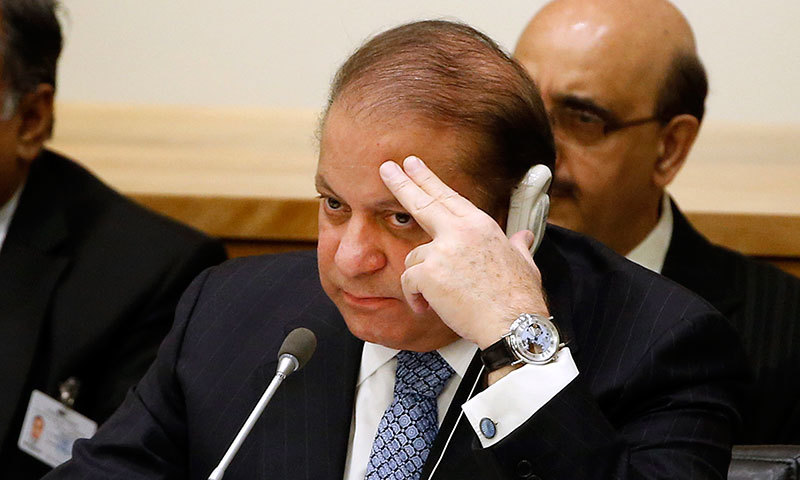Will PM Sharif's Defiant Political Gambit Pay Off?
MOHAMMED RIZWAN

TORONTO: Caged Pakistan Prime Minister Nawaz Sharif decided to play, perhaps the most important hand of his political career, when he decided to appear in person before the Joint Investigation Team (JIT) constituted by the Supreme Court to look into the PM’s role in the corruption scandal that surfaced after the Panama Papers leaks.
PM Sharif was served the summons when he arrived back from Ostana, Kazakhstan after taking part in Shanghai Cooperation Organisation meeting. The prime minister has the option to claim immunity from the personal summons or PMO has the powers to call the JIT to PM House due to security reasons but Sharifs political wits told him to appear before the court and tell his story.
He is certain to reap the immediate political windfall from the decision however, this is not the first time he is appearing before the Supreme Court. In November 1997, a Supreme Court bench headed by the chief justice was due to hear the contempt of court proceedings against the then prime minister Nawaz Sharif when the government unleashed goons who attacked the supreme court and the honourable judges of the apex court including chief justice had to take cover and flee the court.
So this hearing is the second time, and if one listens to the tone and tenor of the PML-N ministers it is certainly aggressive and defiant.
The difference between the last time and the current situation is in 1997, the army chief did not come to save the chief justice despite the CJP Sajjad Ali Shah’s request to provide the security. The current army chief General Bajwa doesn’t look like saving the day for Nawaz. Had it been the case Nawaz would have never decided to appear before the JIT which is headed by a Grade 21 police officer and comprises two brigadiers each from ISI and MI among others. Also even if now Sharif had claimed prime ministerial immunity, the overseeing bench of the Supreme Court, may issue direct summons over-riding the immunity.
The entire Panama Leaks saga revolves around one basic question. How did the prime ministers and his sons bought properties overseas especially the Mayfair flats in London. The court is asking the money trail and that exactly the prime minister and his family has failed to produce so far.
PM’s lawyers have built the entire case on the premise that in 70s NS father Mian Sharif set up a steel mill in UAE (No money trail presented) and in late seventies that mill was sold and the proceeds were given to a Qatari prince to invest in various businesses. The profit and proceeds from those businesses were transferred to NS sons Hussain and Hasan in 2006 and they bought the London apartments. They are three luxury apartments priced at six billion Pakistani rupees. In proof the Qatari prince wrote a letter to the supreme court three months back that he got the money from NS father and invested it. But how the money reached Qatar and later to Saudi Arabia where Sharif family set up another steel mill while in exile, has no trail at all.
When all concludes and JIT asks the Supreme Court to decide on what action could be taken as Sharifs have failed to establish the money trail and the supreme court determines that there are solid grounds to pursue criminal charges against Sharifs, this would have drastic consequences on politics of House of Sharifs.
In this scenario Imran Khan’s PTI would gain tremendous political ground in Punjab, the province that elects prime minister. But if the court decides on a verdict which is neither here nor there in a bid to minimise the political damage, again it will go in favour of Sharifs’ major political rival Imran Khan as he would call it a judiciary-Sharif compromise. And there is not enough time for Sharifs to salvage the situation as elections are due in 11-month time.



